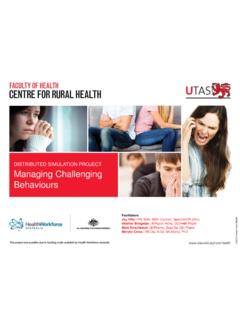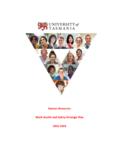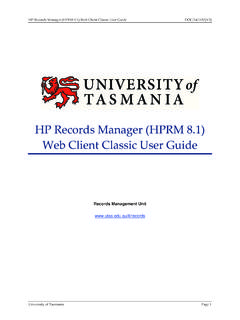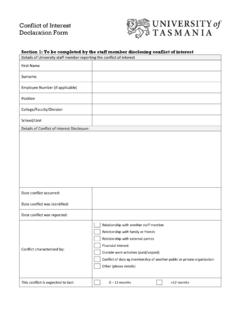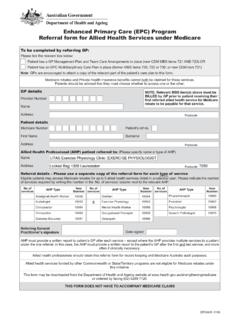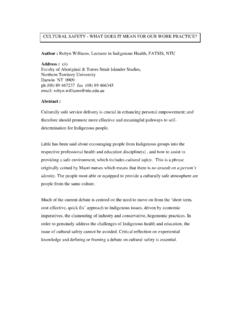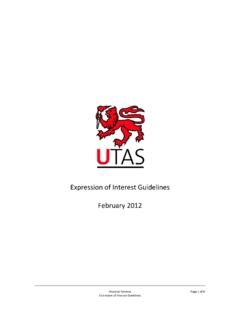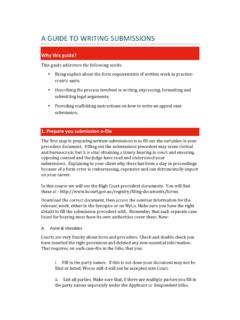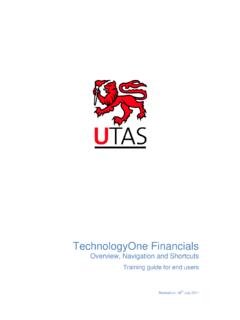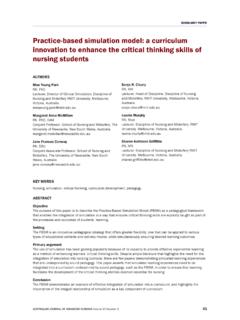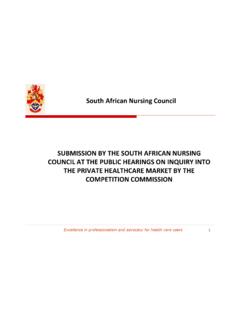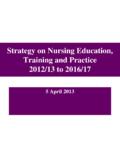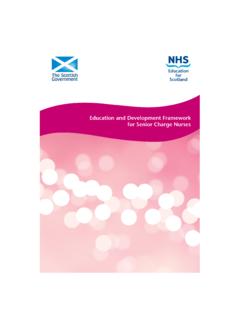Transcription of Methodological rigour within a qualitative framework
1 Methodological ISSUES IN nursing RESEARCHM ethodological rigour within a qualitative frameworkGerard A. TobinBSc MSc RGN RMN RCNT RNTL ecturer, School of nursing and midwifery Studies, The University of Dublin Trinity College, and Clinical nursing ResearchFellow, Health Research Board, Dublin, IrelandCecily M. BegleyMSc PhD RGN RM RNT FFNRCSIP rofessor of nursing and midwifery /Director, School of nursing and midwifery Studies, The University of Dublin TrinityCollege, Dublin, IrelandSubmitted for publication 24 November 2003 Accepted for publication 7 June 2004 Correspondence:Gerard Tobin,School of nursing and midwifery Studies,The University of Dublin,Trinity College,24 D Olier Street,Dublin 2, : & BEGLEY (2004)TOBIN & BEGLEY (2004)Journal of Advanced Nursing48(4), 388 396 Methodological rigour within a qualitative paper discusses the literature on establishing rigour in research studies.
2 Itdescribes the Methodological trinity of reliability, validity and generalization andexplores some of the issues relating to establishing rigour in naturalistic working within the naturalistic paradigm have questioned theissue of using validity, reliability and generalizability to demonstrate robustness ofqualitative research. Triangulation has been used to demonstrate confirmability andcompleteness and has been one means of ensuring acceptability across criteria such as goodness and trustworthiness can be used to evaluate therobustness of naturalistic is argued that the transference of terms across paradigms is inap-propriate; however, if we reject the concepts of validity and reliability, we reject theconcept of rigour .
3 Rejection of rigour undermines acceptance of qualitative researchas a systematic process that can contribute to the advancement of criteria for demonstrating robustness in qualitative inquiry, such asauthenticity, trustworthiness and goodness, need to be considered. Goodness, whennot seen as a separate construct but as an integral and embedded component of theresearch process, should be useful in assuring quality of the entire study. Triangu-lation is a tried and tested means of offering completeness, particularly in mixed-method research. When multiple types of triangulation are used appropriately as the triangulation state of mind , they approach the concept of crystallization, whichallows for infinite variety of angles of researchers need to be explicit about how and why theychoose specific legitimizing criteria in ensuring the robustness of their shift from a position of fundamentalism to a more pluralistic approach as a meansof legitimizing naturalistic inquiry is.
4 Reliability, validity, generalization, trustworthiness, triangulation,crystallization388 2004 Blackwell Publishing LtdIntroductionAccording to Kvale (1995), the concepts validity, reliabilityand generalization have virtually attained religious sancti-fication, almost reaching the status of a holy trinity,worshipped by all true believers in science. In this paper,we explore the trinity of truth as a means of offeringlegitimization and demonstrating rigour in naturalisticinquiry. We identify the origins of the debate aroundvalidating qualitative studies, explore the idea of triangu-lation vs.
5 Crystallization, and propose a move towards theuse of emerging criteria for assessing quality and robustnessin qualitative researchIn recent discussions, the role of validity, reliability andgeneralizability has been questioned, and within a natural-istic ( qualitative ) paradigm the concept of an objectivereality validating knowledge has been generally discarded(Kvale 1995). Debate about the relationship betweenrationalistic (quantitative) and naturalistic paradigms isoften muddled and confused (Bryman 2002), and the clutterof terms and arguments has resulted in the conceptsbecoming obscure and unrecognizable (Morseet ).
6 Difficulty arises because of a tendency to discuss philosoph-ical and technical issues in the same context: Philosophicalissues relate to questions of issuesbespeak the consideration of the superiority or appropriate-ness of methods of research in relation to one another (Bryman 2002, p. 14). The former is theoretical and thelatter intensely guidelines on the establishment of validity,reliability and generalizability have been vigorously debatedacross disciplines (Mays & Pope 2000), many who do notembrace the qualitative paradigm remain sceptical. It hasbeen suggested that, despite the long history and undeni-able contribution of qualitative research, opponents ofthese methods dismiss qualitative criteria as radical, non-rigorous and subjective (Denzin & Lincoln 2000b).
7 Thissame critique also emerges from qualitative authors such asVan Maanen (1995), Smith and Deemer (2000) and Morseet al.(2002). It could be argued that this crisis arose asresearchers moved from a detached outsider position tothat of integrated insider; from the researcher using aresearch instrument to the researcher being the instrument(McCracken 1988).Debate around the relevance and use in the naturalisticparadigm of the terms validity, reliability and generalizabilityhas continued over 20 years (Guba & Lincoln 1981,Sandelowski 1986, Mishler 1990, Lather 1995, Lincoln1995, Morseet ). Much of current understandingof the difficulties associated with these concepts has emergedas researchers have striven for clarity of purpose in qualit-ative methodologies (Lather 1993, Altheide & Johnson1994).
8 Differences in epistemological perspectives betweenthe two paradigms have been highlighted, particularly byqualitative researchers as they have endeavoured to establisharguments for rigour in their methodology (Bryman 2002).It has been suggested that concerns about rigour may be duepartly to the fact that we are being drawn into a positivist,reductionist mode of thought and in the process are losingintegrity in our own Methodological positions (Aroniet ). It seems that, due to a long history of producingimportant findings, quantitative research has become thelanguage of research rather than the language of a particularparadigm. Use of this language in qualitative research, andthe need to prove that an unbiased approach has been usedmay stem from a desire for intellectual and scientificacceptance by the academic assurance criteriaLanguage is the basis on which philosophical beliefs arearticulated and communicated.
9 As language differs withinphilosophical perspectives, it is argued that the transferenceof terms across paradigms is inappropriate (Hamberg &Johansson 1999). Values, beliefs, epistemology and ontologyof paradigms may not be comparable and may be semanti-cally incompatible. This has led to a number of developmentsin qualitative inquiry, especially in the areas of quality androbustness of research; however, establishing a consensus oncriteria for assessing quality of a qualitative study remainselusive. Indeed, some authors have questioned whetherconsensus can or will be achieved (Wainwright 1997, Sparks2001, Seale 2002). As the field of qualitative inquiry is stillemerging and being defined, what is needed is not consensusbut a recognition of emerging criteria in the qualitativeparadigm (Lincoln 1995).
10 Epistemological developments in qualitative researchThe evolution of qualitative research has been discussed as amethodological journey. Writing on epistemological devel-opments, Denzin and Lincoln (2000a)) identify seven majormoments or turns in qualitative research (Table 1).These turns offer a picture of epistemological, philosoph-ical and Methodological developments of qualitative researchmethods, and trace the epistemology of validity and reliab-ility as issues in nursing researchMethodological rigour 2004 Blackwell Publishing Ltd,Journal of Advanced nursing ,48(4), 388 396389 RigourA major argument presented in the literature concerns theneed for a new approach and to reject anything that mightlink qualitative inquiry to the positivist quantitativeapproach; hence, the rejection of the terms validity and reli-ability (Peck & Secker 1999, Whittemoreet ).
